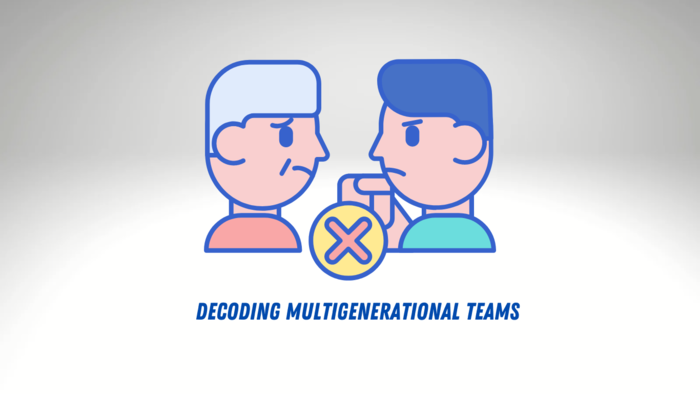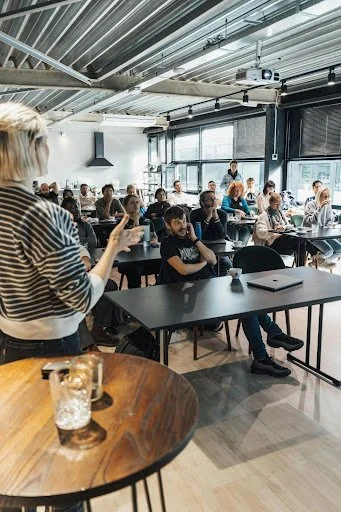An Inclusive December Holiday: International Human Rights Day
By Marion Davis
Organizations may encounter a struggle during the fall and winter holidays as they search for inclusive celebrations that all members of an organization can appreciate. In December, in addition to religious and traditional holidays, a lesser-known day is International Human Rights Day on December 10. This date commemorates the creation of the Universal Declaration of Human Rights (UDHR), a declaration made by the United Nations General Assembly in Paris on December 10, 1948. This document noted that all humans are equal across “race, color, religion, sex, language, political or other opinion, national or social origin, property, birth or other status.” This document was the first time that human rights had been outlined and recognized globally as fundamental human rights to be universally protected and expanded upon nationally and internationally. For this year, the United Nations (UN) has chosen the theme "Our Rights, Our Future, Right Now.” The 2024 focus looks at the role of human rights in everyday life and examines how the exploration of human rights can provide a pathway to solutions for a better tomorrow with more peaceful and equal communities.
However, achieving unity requires navigating the deep divides exacerbated by politics, economics, and social changes. While national politics often reflect and amplify these divides, examples like Chattanooga, Tennessee, demonstrate how grassroots efforts can promote collaboration and tangible progress. Reaching across the aisle needs to be an act at the local level in addition to an act within Congress as neighbors who voted differently during the recent election work together to determine how best to support the vulnerable people in their communities.
Chattanooga: A Model for Grassroots Unity
In 2023, while homelessness increased by 12 percent nationwide, Chattanooga achieved a remarkable 49 percent reduction in the city’s homeless population. This success stemmed from a multifaceted approach that prioritized housing, eviction prevention, and targeted support for at-risk groups. Programs like the Eviction Prevention Initiative provided financial assistance for past-due rent, moving costs, and legal representation, helping 334 households avoid eviction between 2021 and 2023. This initiative also leveraged collaborations between local governments, nonprofits, and social workers to stabilize families and individuals. As far as political leanings, Chattanooga is a city with inhabitants that tend to lean liberal within a county that tends to lean conservative.
Targeting specific populations, such as veterans and young adults, was another key strategy. By addressing root causes early, Chattanooga reduced the likelihood of long-term homelessness among vulnerable groups. These efforts were bolstered by investments in permanent supportive housing, providing nearly 200 affordable units for chronically homeless individuals, many of whom were single men often overlooked by broader federal programs.
While challenges remain, including rising housing costs and insufficient supply, Chattanooga's experience highlights the power of community-driven action. It demonstrates that practical, localized solutions can address systemic issues like homelessness sometimes more effectively than top-down approaches. Chattanooga’s success story shows the importance of taking action at the local level rather than practicing divisiveness among neighbors based on how these individuals voted at the federal level.
Unity Beyond Partisanship
Chattanooga’s achievements offer lessons for bridging divides in a polarized political landscape. As political writer Tom Perriello argues, focusing solely on bipartisan deal-making in Congress often fails to address the root causes of division. Instead, unity must be built through actions that deliver tangible benefits for all. Programs like Chattanooga's housing initiatives embody this philosophy by prioritizing results over rhetoric, creating shared goals that transcend political lines. In short, unity is a grassroots movement in and of itself. How can people in the US fight for the rights of all people across race, color, religion, sex, language, national or social origin, property, birth, or other status if we are so divided across diversity of thought and across political lines?
There is a reason why the Universal Declaration of Human Rights (UDHR) mentioned political and other opinions within the universality of human rights. Even more so than in the year of the UDHR’s birth in 1948, today’s divisive political climate often pits groups against each other, hindering progress in paving a path forward for all human rights. For example, social media amplifies polarization, with posts encouraging division rather than dialogue among neighbors. Instead of isolating ourselves based on political choices, we should look for shared values and opportunities to collaborate, much like Chattanooga did to address the housing crisis and support vulnerable groups.
The Role of Human Rights Day
International Human Rights Day provides a platform to celebrate and reflect on these values. It challenges us to move beyond political allegiances and focus on our shared humanity. Grassroots movements, inspired by examples like Chattanooga, can use this day to spark conversations, organize community initiatives, and advocate for inclusive policies.
As we approach December 10, organizations can create events to recognize the importance of unity at grassroots levels in addressing systemic challenges. Whether through housing initiatives, dialogue across political divides, or advocacy for universal rights, the principles of the Universal Declaration of Human Rights remind us that progress begins with understanding and collaboration. Perhaps much of the fear currently in the US after Trump’s win in the recent election is a fear that stems from feeling powerless. If people who believe in liberal values are not working in a country with a government headed by a Democratic president, then what else can they do? There appears to be a theme of hopelessness and powerlessness.
However, the field of psychology posits that a fear of the unknown comes from a lack of confidence in one’s ability to succeed. In the world of education, teachers often work with their students to overcome these fears by creating progressively more difficult tasks but with each segment being within their students’ current level of ability to complete. With the accomplishment of each task, the students feel confident in their ability to succeed and thus are motivated to continue improving to complete future tasks for further reinforcement and affirmation of their abilities. Similarly, organizations celebrating International Human Rights Day can create steps that employees can take within the organization or within local communities to feel a sense of accomplishment and confidence in their abilities to promote inclusivity. These initiatives can support the community and benefit the organizations as their employees grow in confidence. Employees report that they are more loyal to the employer brand, are higher performers on the job, and are less stressed when their confidence is increased.
Practical Steps for Supporting Employee Confidence at the Grassroots Level
By implementing targeted strategies to build employee confidence through promoting inclusivity and equity through grassroots movements, organizations can simultaneously benefit their communities and enhance their internal culture.
1. Organize Community Service Projects
Engaging in community service allows organizations to address local needs while encouraging team cohesion. To create a volunteering program in the workplace to send corporate volunteers into the local communities, organizations can:
Collaborate with Local Shelters: Partner with shelters to provide resources, volunteer support, or fundraising assistance.
Support Affordable Housing Projects: Participate in building or renovating affordable housing units, offering employees hands-on involvement in community development.
The benefits of these activities include addressing immediate community needs and enhancing employee morale, teamwork, and organizational reputation.
2. Facilitate Open Dialogues Across Political Divides
Creating spaces for open, respectful conversations can bridge political and ideological gaps. Hosting forums or workshops that encourage discussions on human rights issues allows individuals to share perspectives and find common ground. Such dialogues can be guided by trained facilitators to ensure constructive and inclusive participation, encouraging understanding and collaboration among diverse groups. There are already resources designed to facilitate dialogue across parties in online, moderated discussions, such as that provided in the StoryCorps initiative.
3. Advocate for Inclusive Policies
Organizations can leverage their influence to advocate for policies that promote human rights and inclusivity. This can involve supporting local legislation aimed at protecting marginalized communities, participating in awareness campaigns, or partnering with advocacy groups to amplify efforts. By actively engaging in policy advocacy, organizations demonstrate a commitment to systemic change and empower their members to contribute to broader societal progress. An article earlier this year discussed the trend of political posturing within corporations. The author explains that companies stepped into the political ring to both respond to the call to action by investors, activists, and employees and also to take advantage of these opportunities to market products. The article outlines that many people welcome corporate political posturing, making the argument that corporations are powerful and can bring attention to important issues. However, the author argues that political posturing has proven to create significant financial risks for businesses and to also have a negative effect on society as their political posturing comes from a financial standpoint rather than a moral one. If corporations are going to use their influence to take a stance, this stance should be one of encouraging unity and bipartisan community involvement for their employees at the grassroots level.
4. Implement Educational Workshops
Educational initiatives can empower individuals with knowledge and tools to promote human rights. Workshops focusing on topics such as implicit bias, cultural competency, and the history of human rights can enhance awareness and sensitivity among participants. These programs can be tailored to address specific community needs and encourage ongoing learning and development. With political posturing within corporations, this can lead to limited solutions as employees might feel that they cannot speak out from a more liberal stance or a more conservative stance.
By encouraging a bipartisanship approach to grassroots involvement to address local issues, corporations can encourage diversity of thought and demonstrate social impact in the community via their employees while simultaneously using these situations as professional development opportunities for their employees to perform more effectively in the workplace. For example, there is still limited awareness across parties that disabled people do not receive a livable income on government benefits, that many disabled people are capable of working but cannot due to inaccessible workplaces, and that the Americans with Disabilities Act (ADA) is not effectively enforced to hold corporations accountable for accessibility violations. However, following awareness, Democratic and Republican stances might differ on how best to address this problem. For example, a Democratic perspective might look to greater federal oversight for stronger enforcement of the ADA and greater legal protections for disabled workers while also running public awareness campaigns on the issue; meanwhile, a Republican perspective might say that the market speaks and encourages private businesses to voluntarily comply with the ADA for the economic benefits in hiring disabled workers while also encouraging state- and local-level solutions. A variety of perspectives can be helpful when considering solutions. For example, public awareness campaigns run locally in addition to state- and local-level solutions can address this need on a grassroots level.
5. Encourage Employee-Led Initiatives
Empowering employees to lead initiatives promotes a sense of ownership and confidence. Organizations can support the formation of employee resource groups focused on various aspects of human rights, providing resources and platforms for these groups to implement projects and events. This approach not only promotes inclusivity within the organization but also builds leadership skills and a culture of proactive engagement.
When employees have an opportunity to take ownership of their work, this can increase employee engagement, morale, and retention. Furthermore, a focus on encouraging employees to take ownership of projects is a sign of a positive and constructive workplace culture. The creation of grassroots community programs led by corporate employees can be a prime source of projects where employees can exercise leadership abilities and develop additional skills. Additionally, for many small businesses, grantmakers often ask about the businesses’ current and intended level of community involvement with this factor being a competitive aspect in for-profit grant proposals. Ultimately, community involvement in grassroots movements can increase brand awareness for a corporation, provide employee learning and project management experience that improves their abilities on the job, make certain businesses more competitive for grants, and support human rights within the local community to promote a sense of self-efficacy and adaptability among employees to make an impact no matter the current political climate or current policies.
Final Thoughts
International Human Rights Day, celebrated on December 10th, offers organizations an opportunity to reflect on the principles of the Universal Declaration of Human Rights (UDHR) and implement meaningful actions to promote inclusivity and unity. By fostering grassroots initiatives, organizations can counter the sense of powerlessness that often emerges in politically polarized environments. Chattanooga’s success in addressing homelessness through community-driven action exemplifies how localized solutions can sometimes bridge divides and address systemic issues more effectively than top-down approaches.
To embrace this day and the values of the UDHR, organizations can take proactive steps such as organizing community service projects, facilitating open dialogues across political divides, advocating for inclusive policies, implementing educational workshops, and encouraging employee-led initiatives. These actions not only support the community but also strengthen internal culture, enhance employee confidence, and promote long-term engagement.
As individuals grapple with political uncertainty and divisive rhetoric, organizations that focus on practical, inclusive actions can build a sense of shared purpose. By emphasizing collaboration over partisanship, companies can create a positive impact in their communities, promote human rights, and empower employees to contribute to a more peaceful and equal society. International Human Rights Day provides a powerful platform for organizations to turn ideals into action, demonstrating that unity and progress often begin at the grassroots level.
Marion Davis is a contributing writer at EmployDiversity.com. She is a disabled DEIA consultant and writes on the value of diversity and inclusion across multiple industries, specifically as relates to disability and intersectionality.














